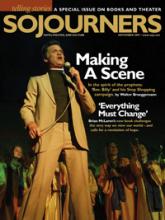Being a disciple takes imagination. As Jesus’ early followers discovered, understanding his stories, teachings, and parables required no small amount of mental agility. A camel traveling through the eye of a needle? The kingdom of God like a mustard seed? Lose your life to save it?
The simple settings and characters of Jesus’ stories helped direct listeners toward the truths that lay underneath. This alternate world Jesus came to reveal was so radical, so unlike what his listeners—then and now—understood to be real, that his stories, with their unexpected plot twists, surprising language, and elements of mystery, helped uncover what had previously been hidden.
Whether they’re collected in books or enacted in front of us, many stories still perform that function. Through language, setting, and characters, authors and playwrights entertain and educate us, puncture our illusions, and surprise us with new perspectives. They can help us see more clearly both the world we inhabit and the world Jesus calls us to help create.
In the realm of theater, for example, the actions of the bullhorn-carrying, pompadoured “Reverend Billy” might amuse or even offend us, but when this “preacher” and his Church of Stop Shopping urge us to turn away from the consuming ideology of our “temples of commerce” and avoid the “Shopocalypse,” it’s not hard to imagine Jesus saying “Amen.” Whether or not the actor behind Rev. Billy intends it, his performance invites us to imagine ourselves inside the biblical narrative, at the scene of Jesus’ rampage against the temple markets of his day. How would we have responded?
Read the Full Article
